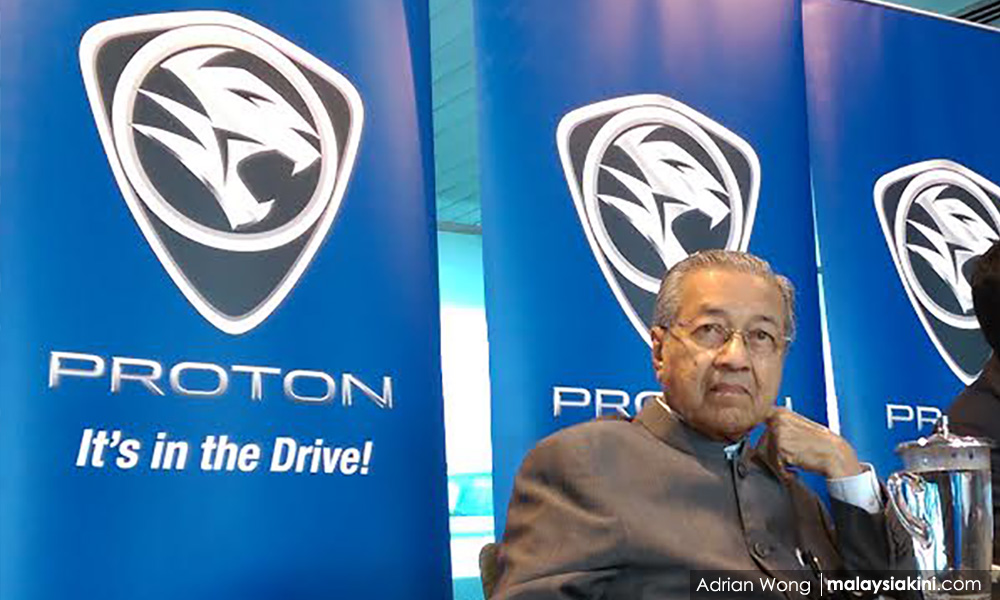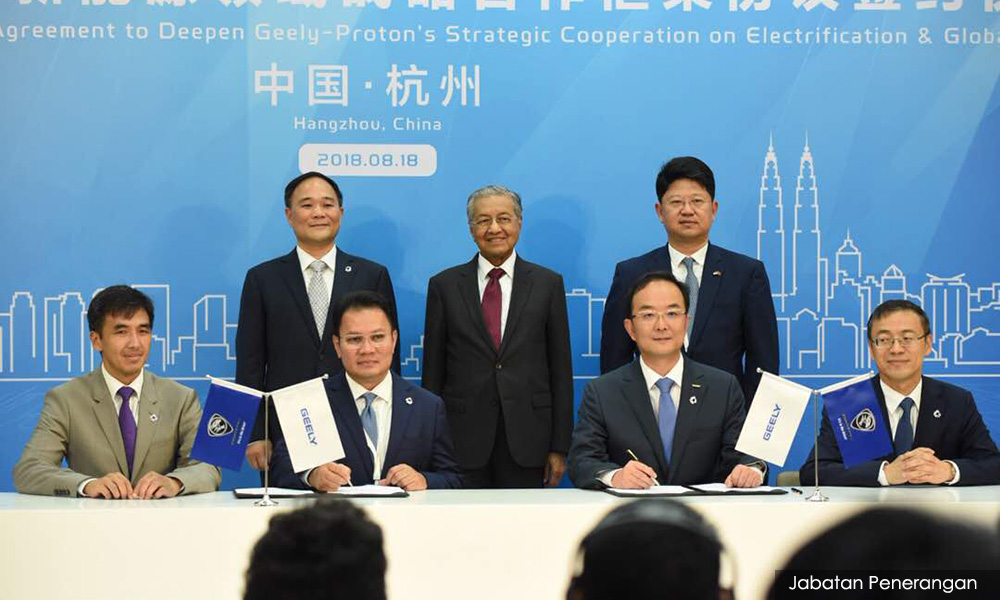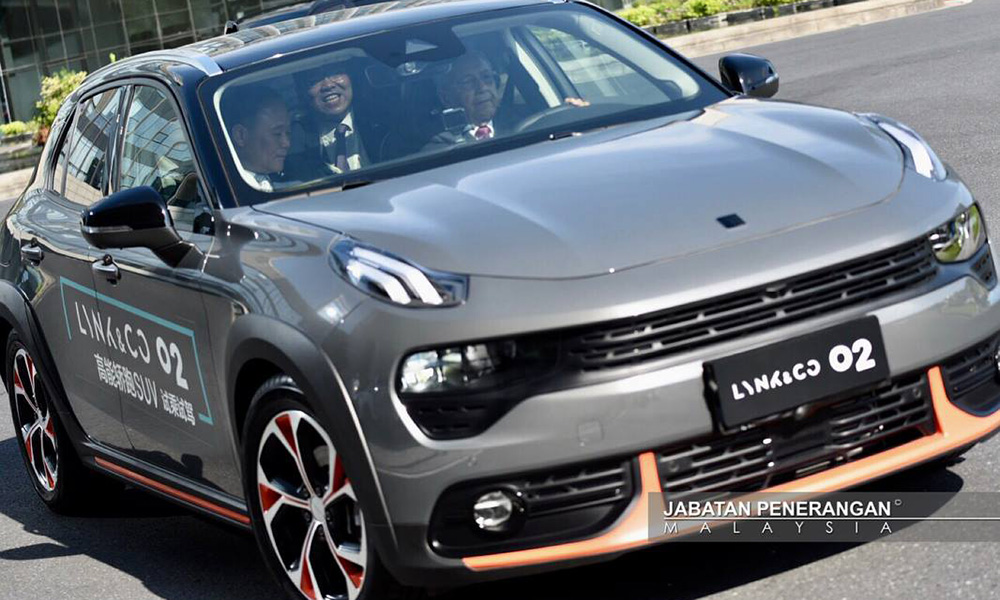
QUESTION TIME | Does this strike you as a strategic venture? Proton Holdings Bhd does a technology tie-up with China's Zhejiang Geely Holding Group, as a result of which Geely takes a 49.9 percent stake in Proton, with the other 51.1 percent owned by Syed Mokhtar Albukhary’s listed DRB-Hicom.
And then Geely and Proton set up an equally-owned joint venture to make and sell Proton cars in China. Here’s the rub – the cars will be mainly from the Geely platform, although some of the cars may be designed by Proton. How weird. Why would Geely do that? And what chance does Proton have of succeeding when Geely is a much better-known brand in the country?
Over the last weekend, that’s exactly what Proton and Geely did, signing a heads of agreement in Hangzhou for Proton to assemble and market their cars in China in a 50-50 joint venture. Of course, Proton advocate and protector, Prime Minister Dr Mahathir Mohamad, was there to cheer the deal on.
In an announcement to the stock exchange, DRB-Hicom said the venture will include the establishment of an assembly facility in China, and the development of a network of dealers to market Proton cars in China. It will also allow for certain Proton platforms to be developed into models for sale in the country.
According to DRB-Hicom group managing director Syed Faisal Albar, having Geely on board as a strategic partner gives Proton an easier route into the lucrative Chinese market.

“Clearly with Geely on board, Proton’s route into China has become more tenable. Part of Geely’s role is to secure the manufacturing licenses and regulatory approvals required for such a venture under China’s regulations. Geely will also identify a suitable location where the manufacturing facility is to be based.”
Clearly, Syed Faisal is eying a share of the 24 million cars a year sold in China, but is it going to be that simple? And what would the JV do for Proton effectively? Not much, it looks like.
What’s in it for Geely?
Based on DRB-Hicom’s own figures, Geely’s market share in China is just five percent. But this 1.24 million figure is more than double the total passenger vehicle sales in Malaysia of some 515,000 units. And the market that it takes will be largely from Geely. Why would Geely help Proton do that?
It could be because it provides the key components such as the engine, transmission and chassis. It can price these components to make it advantageous for itself, and Proton may not even know about it!
Also, if Proton takes a 50 percent stake in this venture, Geely still has near 75 percent control in the JV – a direct 50 percent and an additional 25 percent through its 49.9 percent share in Proton. Proton is a manufacturer only in name – it is not like Toyota having a plant in the US for the market there, which it probably wholly owns.
At the end of the day, it’s all wayang kulit - it gives the appearance of Proton entering the China market, while it is Geely that is expanding its production facilities. The profit that Proton will get via its 25 percent stake will be at the mercy of Geely and how much they want to transfer to the plant. Remember, it’s an assembly plant after all.
So much for Proton’s China venture.
Amid this smokescreen, the real deal relates to the announcement that Mahathir made alongside the China deal, when he said that he was now looking forward to the Geely-Proton partnership expanding into the international market.
“Seeing what Geely has done, I think they have the capacity to produce an electric car together with Proton. I believe it will be sufficient for the Asean market and maybe other markets,” Mahathir said.

If Proton produces electric cars or energy efficient vehicles (EEVs) for Malaysia, it is almost a given that the infancy argument will be used to give it preferential access by imposing a high tariff on other EEVs entering the country. This is likely to be done via the devious protectionist scheme currently employed, which lowers duties for cars that have higher local content.
So it is likely that Proton 2.0 may turn out to be Proton’s production of EEVs behind high tariff walls, and yet again the Malaysian public will end up paying for the profits and foibles of Proton and its shareholders – which in this case includes in almost equal parts a China company and Mahathir crony Syed Mokhtar.
Syed Mokhtar is a long-time friend of the prime minister who has benefited enormously from government largesse, including independent power producing and port operating concessions.
He has already positioned himself for such an eventuality, selling Alam Flora from DRB-Hicom to related company Malakoff for RM945 million in cash, part of the proceeds of which will be used to produce new Proton models.
Conflict of interest
Mahathir is terribly conflicted when it comes to Proton. It is his baby and he wants to protect it and extend it a lifeline, despite the very high cost in tariffs that Malaysians had to pay over the years – some RM360 billion, assuming duties average RM30,000 higher for each of 12 million or so vehicles sold between 1985 and 2016. He is also conflicted because Syed Mokhtar is a close friend.
Recently, attorney-general Tommy Thomas recused himself from deciding on whether to continue to prosecute finance minister Lim Guan Eng’s corruption case because he had acted for him before. Mahathir should follow his example.
It is high time – due to very serious conflicts of interest which could cost the country billions and billions of ringgit – that Mahathir recuses himself from all decisions relating to Proton.
The ministers and others involved, including civil servants, should be given the prerogative to call this one according to economic sense, so that nonsense does not prevail.
This will also gel with Pakatan Harapan’s stated intention of good corporate governance based on economic viability, fairness and always considering the larger public interest – not any single person’s view of what shape the auto industry should take, even if that person is the prime minister.
P GUNASEGARAM says conflicts of interest arising from government leaders allotting projects to cronies arbitrarily has probably caused trillions of ringgit in losses over the years, far exceeding the claimed but dubious national debt figure of over RM1 trillion. Email: t.p.guna@gmail.com -Mkini


No comments:
Post a Comment
Note: Only a member of this blog may post a comment.